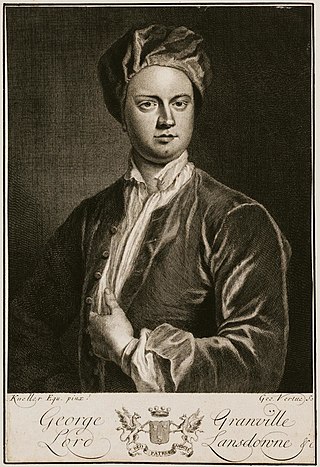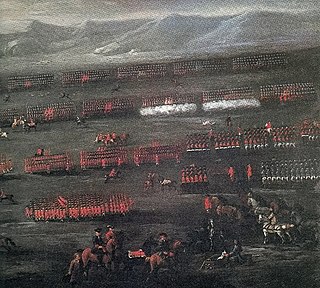
Francis Atterbury was an English man of letters, politician and bishop. A High Church Tory and Jacobite, he gained patronage under Queen Anne, but was mistrusted by the Hanoverian Whig ministries, and banished for communicating with the Old Pretender in the Atterbury Plot. He was a noted wit and a gifted preacher.

Edward Villiers, 1st Earl of Jersey was an English peer, courtier, and statesman of the Villiers family. He was created Baron Villiers and Viscount Villiers in 1691 and Earl of Jersey in 1697. A leading Tory politician opposed to the Whig Junto, he was made Southern Secretary in 1699.

Charles Middleton, 2nd Earl of Middleton, Jacobite 1st Earl of Monmouth, PC was a Scottish and English politician who held several offices under Charles II and James II & VII. He served as Secretary of State for Scotland, the Northern Department and the Southern Department, before acting as Jacobite Secretary of State and chief advisor to James II and then his son James III during their exile in France.

The Dukedom of Albemarle has been created twice in the Peerage of England, each time ending in extinction. Additionally, the title was created a third time by James II in exile and a fourth time by his son the Old Pretender, in the Jacobite peerage. The name Albemarle is derived from the Latinised form of the French commune of Aumale in Normandy, other forms being Aubemarle and Aumerle. It arose in connection with the ancient Norman Counts of Aumale of Aumale in Normandy.

Earl of Bath was a title that was created five times in British history, three times in the Peerage of England, once in the Peerage of Great Britain and once in the Peerage of the United Kingdom. It is now extinct.

William Herbert, 1st Marquess of Powis, KG, PC (1626 – 2 June 1696) was an English nobleman, best remembered for his suffering during the Popish Plot. He succeeded his father as 3rd Baron Powis in 1667 and was created Earl of Powis in 1674 by King Charles II and Viscount Montgomery, of the Town of Montgomery, and Marquess of Powis in 1687 by King James II, having been appointed to the Privy Council in 1686.

George Granville, 1st Baron Lansdowne PC, of Stowe, Cornwall, was an English Tory politician who sat in the English and British House of Commons from 1702 until 1712, when he was raised to the peerage as Baron Lansdown and sat in the House of Lords. He was Secretary at War during the Harley administration from 1710 to 1712. He was also a noted poet and made a name for himself with verses composed on the visit of Mary of Modena, then Duchess of York, while he was at Cambridge in 1677. He was also a playwright, following in the style of John Dryden.
Caryll Molyneux, 3rd Viscount Molyneux was an English peer.

Sir John Pratt (1657–1725) was an English judge and politician. He was Lord Chief Justice of England from 15 May 1718 until 2 March 1725. He was appointed as an interim Chancellor of the Exchequer on 2 February 1721 until 3 April 1721.

John Hay of Cromlix (1691–1740) was the Jacobite Duke of Inverness and a courtier and army officer to King James VIII & III. He was from the Clan Hay.
Baron Caryll of Durford (or Dunford) of Harting in West Sussex is a title in the Jacobite Peerage of England created by the dethroned King James II for John Caryll, poet, dramatist and diplomat, with apparently a special remainder to the issue male of his brothers.
John Caryll was the second Jacobite Baron Caryll of Durford.
John Baptist Caryll was the third Jacobite Baron Caryll of Durford.

Richard Graham, 1st Viscount Preston PC was an English diplomat and politician who sat in the House of Commons in two periods between 1675 and 1689. He became a Jacobite conspirator, but his reputation in the Jacobite community suffered when he gave evidence against his co-conspirators in exchange for a pardon.

The Jacobite rising of 1715 was the attempt by James Edward Stuart to regain the thrones of England, Ireland and Scotland for the exiled Stuarts.

The Atterbury Plot was a conspiracy led by Francis Atterbury, Bishop of Rochester and Dean of Westminster, aimed at the restoration of the House of Stuart to the throne of Great Britain. It came some years after the unsuccessful Jacobite rising of 1715 and Jacobite rising of 1719, at a time when the Whig government of the new Hanoverian king was deeply unpopular.

George Barclay led an unsuccessful attempt to ambush and kill William III and II of England, Scotland and Ireland in early 1696.
John Parker was an English army officer and Jacobite conspirator.
Sir Henry Goring, 4th Baronet, of Highden, Washington, Sussex, one of the Goring baronets of Highden, was an English politician who had a part in the Jacobite Atterbury Plot of 1721.












